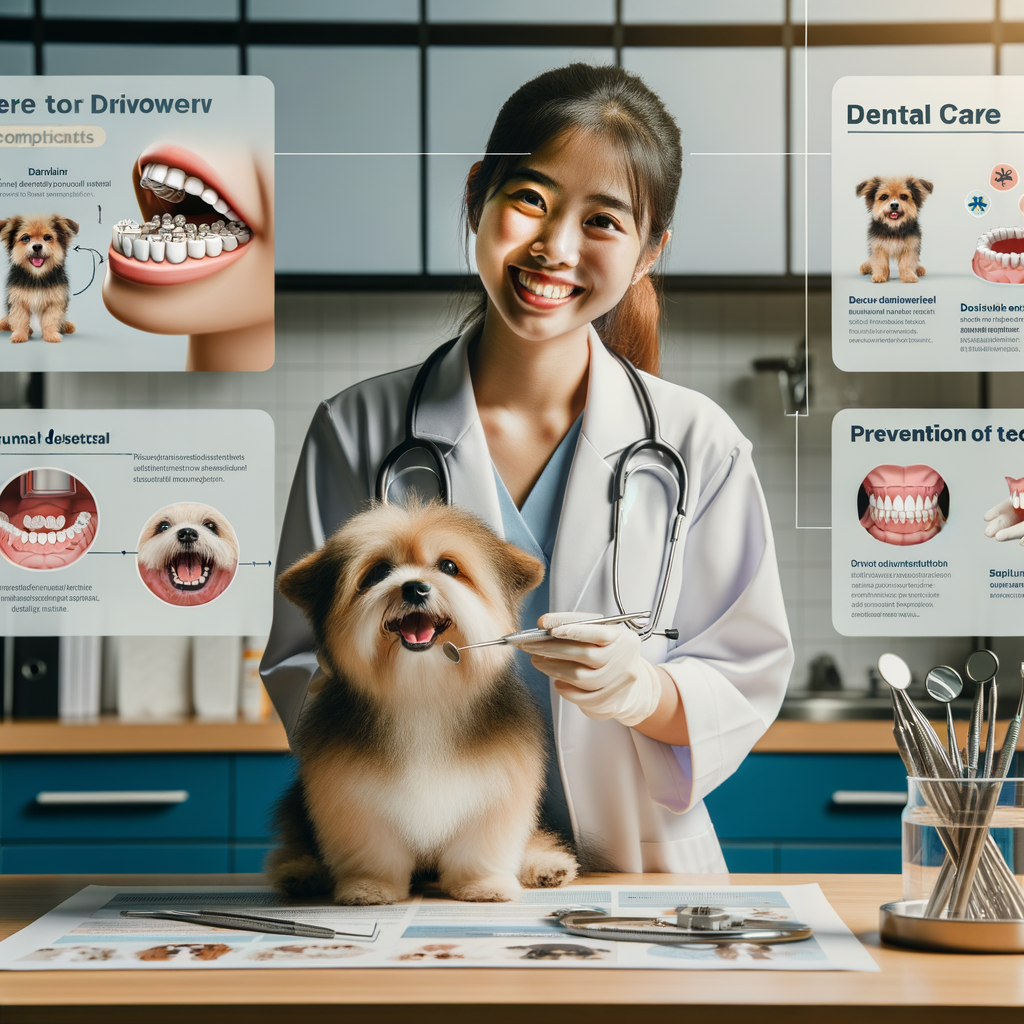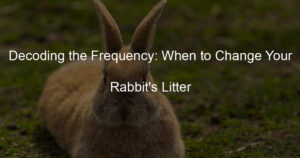
Introduction to Dental Health in Dwarf Breeds
Dental health is a vital aspect of overall well-being, and this holds true for all creatures, including dwarf breeds. These smaller breeds often have unique dental health needs and challenges that require special attention. In this section, we will explore the importance of dental health in dwarf breeds and discuss some of the common dental problems they face.
- Importance of dental health in dwarf breeds
- Common dental problems in dwarf breeds
- Overgrown teeth: This is a common problem in many dwarf breeds. If not addressed, overgrown teeth can cause difficulty eating and can lead to weight loss and other health issues.
- Dental disease: Dwarf breeds are also susceptible to dental diseases like gingivitis and periodontitis, which can cause pain, bad breath, and tooth loss.
- Misaligned teeth: Due to their small size, dwarf breeds often have crowded or misaligned teeth, which can lead to uneven wear and tear and other dental problems.
Just like in humans, dental health in dwarf breeds is crucial for their overall health. Poor dental health can lead to a variety of problems, including difficulty eating, bad breath, and even serious infections. Moreover, dental problems can cause pain and discomfort, affecting the quality of life of these small creatures.
Regular dental check-ups and proper dental care can prevent these issues, ensuring that your dwarf breed leads a healthy, happy life. It’s not just about keeping their teeth clean and shiny, but also about maintaining their overall health and well-being.
Dwarf breeds are prone to certain dental problems due to their small size and unique physical characteristics. Some of the most common dental issues they face include:
Understanding these common dental problems can help you take proactive steps to prevent them and ensure your dwarf breed’s dental health.
Dental Care for Dwarf Breeds: An Overview
When it comes to dental care, dwarf breeds have unique needs that differ from those of larger breeds. Understanding these needs is crucial to maintaining their oral health. Regular dental check-ups are also vital in preventing dental issues and ensuring the overall well-being of your pet.
- Understanding the unique dental needs of dwarf breeds
Dwarf breeds, due to their small size, often have a compact jaw structure. This can lead to overcrowding of teeth, making them more susceptible to dental diseases. Their teeth are also smaller and more delicate, requiring gentle care. Furthermore, dwarf breeds may have a faster rate of dental decay due to their diet and chewing habits. Therefore, it’s essential to understand these unique needs to provide the right dental care.
- Importance of regular dental check-ups
Regular dental check-ups are a must for dwarf breeds. These check-ups allow for early detection of any potential dental issues, such as tooth decay or gum disease. Regular cleanings can also help prevent the build-up of plaque and tartar, which are common causes of dental problems. Moreover, dental check-ups provide an opportunity for your vet to monitor the overall oral health of your pet and suggest preventive measures.
Remember, the key to maintaining your pet’s dental health lies in understanding their unique needs and ensuring regular check-ups. With proper care and attention, you can help your dwarf breed lead a healthy and happy life.
| Dental Care Tips for Dwarf Breeds |
|---|
| Understand their unique dental needs |
| Ensure regular dental check-ups |
| Provide a diet that promotes dental health |
| Encourage regular chewing habits to strengthen teeth |
Preventing Dental Issues in Dwarf Breeds
One of the most effective ways to prevent dental issues in dwarf breeds is through proper nutrition. A balanced diet plays a crucial role in maintaining your pet’s dental health and can significantly reduce the risk of dental diseases.
Proper Nutrition
Let’s delve deeper into the importance of proper nutrition and how it can help in preventing dental issues in dwarf breeds.
- Role of Diet in Dental Health
- Recommended Foods for Dental Health
The diet of your pet has a direct impact on their dental health. Just like in humans, the foods that your pet consumes can either promote or harm their dental health. A diet rich in hard, crunchy foods can naturally clean your pet’s teeth and remove plaque buildup. On the other hand, a diet high in sugars and carbohydrates can contribute to tooth decay and gum disease.
For optimal dental health, it’s recommended to feed your pet a balanced diet that includes a mix of dry and wet foods. Dry foods can help scrape off plaque from your pet’s teeth, while wet foods provide necessary hydration and nutrients. Some of the best foods for dental health include:
| Food | Benefits |
|---|---|
| Dry kibble | Helps scrape off plaque and tartar |
| Raw carrots | Acts as a natural toothbrush |
| Dental chews | Designed to clean teeth and freshen breath |
Remember, every pet is unique and may have specific dietary needs. Always consult with your vet before making any significant changes to your pet’s diet.
Regular Dental Cleaning
Just like humans, our dwarf breed pets also need regular dental cleaning to maintain their oral health. This section will guide you on the importance of brushing your pet’s teeth and how to choose the right dental cleaning products.
- Importance of brushing your pet’s teeth
- Choosing the right dental cleaning products
Brushing your pet’s teeth is an essential part of their overall health. It helps to remove the plaque and tartar build-up that can lead to gum disease and tooth decay. According to the American Veterinary Dental Society, more than 80% of dogs and 70% of cats have dental disease by the age of 3. Regular brushing can significantly reduce these risks.
Moreover, brushing your pet’s teeth can also help prevent bad breath, which is often a sign of an underlying dental problem. It also gives you the opportunity to check your pet’s mouth for any abnormalities, such as swollen gums or broken teeth.
Choosing the right dental cleaning products for your pet is just as important as the act of brushing itself. Not all products are created equal, and some may be more effective than others.
Firstly, always choose a toothbrush that is the right size for your pet. A toothbrush designed for a large dog will not be suitable for a small dwarf breed. The bristles should be soft to avoid damaging your pet’s gums.
When it comes to toothpaste, never use human toothpaste as it contains ingredients that can be harmful to pets. Instead, choose a pet-friendly toothpaste that is safe for your pet to swallow. These toothpastes often come in flavors that pets love, such as chicken or beef, making the brushing experience more enjoyable for them.
In conclusion, regular dental cleaning is a crucial part of your pet’s health care routine. By brushing your pet’s teeth regularly and choosing the right products, you can help prevent dental disease and ensure your pet’s mouth stays healthy.
Dwarf Breeds Dental Health: Common Problems and Solutions
When it comes to dental health, dwarf breeds are not exempt from problems. In fact, they can be more susceptible to certain issues due to their small size and unique physical characteristics. However, with the right knowledge and care, these problems can be identified early and treated effectively.
- Identifying signs of dental problems
One of the first steps in maintaining your pet’s dental health is being able to identify signs of problems. Here are some common signs of dental issues in dwarf breeds:
- Bad breath: This can be a sign of bacteria buildup in the mouth.
- Loss of appetite: If your pet is having trouble eating, it could be due to a dental problem.
- Discolored or broken teeth: These are clear signs of dental issues that need immediate attention.
- Swelling in the mouth or face: This could indicate an abscess or infection.
Remember, early detection is key to preventing serious dental issues. Regularly check your pet’s mouth and teeth for any signs of problems.
- When to seek veterinary help
While some minor dental issues can be managed at home, it’s important to know when to seek professional help. If your pet shows any of the following signs, it’s time to visit the vet:
- Persistent bad breath despite regular brushing
- Difficulty eating or refusal to eat
- Signs of pain such as pawing at the mouth or face
- Swelling or bleeding in the mouth
Remember, your pet’s dental health is a crucial part of their overall well-being. Regular check-ups with a vet can help prevent serious dental issues and keep your pet healthy and happy.
Tips for Dental Health in Dwarf Breeds
Ensuring the dental health of your dwarf breed pet is crucial. Here are some easy-to-follow home care tips that can help maintain their oral hygiene.
Home Care Tips
- Regular brushing
- Using dental chews and toys
Brushing your pet’s teeth regularly is the first step towards maintaining their dental health. It helps remove plaque and prevents the build-up of tartar. Aim to brush their teeth at least two to three times a week. Use a toothbrush designed for pets and a pet-friendly toothpaste.
Dental chews and toys are not just fun for your pet, but they also contribute to their dental health. Chewing helps in naturally cleaning your pet’s teeth and gums. It also stimulates saliva production, which further aids in the removal of oral debris. However, remember that these are not a replacement for brushing, but a supplementary measure.
By following these simple home care tips, you can play a significant role in maintaining your pet’s dental health. Remember, a healthy mouth contributes to a healthier, happier pet.
Veterinary Care Tips
Keeping your dwarf breed’s teeth healthy involves more than just home care. It’s also crucial to involve a professional in their dental health routine. Here are a couple of veterinary care tips that can help maintain your pet’s dental health:
- Regular Dental Check-ups
Just like humans, pets also need regular dental check-ups. These check-ups are vital for early detection of any potential dental issues. A veterinarian can spot signs of dental disease that are not visible to the naked eye. For instance, they can identify gum disease, tooth decay, and even oral tumors. Regular check-ups, ideally every six months, can help prevent these issues from becoming severe.
- Professional Dental Cleaning
Professional dental cleaning is another essential aspect of your pet’s dental health. This procedure is usually done under anesthesia. It involves removing plaque and tartar from your pet’s teeth, both above and below the gum line. This process can help prevent periodontal disease, a common dental issue among dwarf breeds.
Remember, maintaining your pet’s dental health is a shared responsibility between you and your vet. Regular dental check-ups and professional cleanings are investments in your pet’s overall health and well-being. By following these veterinary care tips, you can ensure your dwarf breed has a healthy and happy life.
Maintaining Dental Health in Dwarf Breeds
Ensuring the dental health of dwarf breeds is a long-term commitment. It requires consistent care and attention to prevent dental issues and maintain overall health. In this section, we will discuss long-term dental care strategies and the importance of consistency in dental care.
- Long-term dental care strategies
- Importance of consistency in dental care
Long-term dental care strategies for dwarf breeds involve regular dental check-ups and daily care routines. Regular check-ups with a vet can help detect any dental issues early and prevent them from becoming severe. It’s recommended to have a dental check-up at least once a year.
At home, daily brushing is crucial. Use a toothbrush designed for small breeds and pet-friendly toothpaste. This helps remove plaque and prevent tartar build-up. Also, provide chew toys that promote dental health. They help in naturally cleaning your pet’s teeth and strengthening their gums.
Consistency in dental care is vital for maintaining the dental health of dwarf breeds. Consistent dental care means sticking to the daily routine of brushing your pet’s teeth and not skipping dental check-ups. This consistency helps maintain your pet’s dental health and prevents the onset of dental diseases.
Remember, dental issues can lead to other health problems if not addressed promptly. Consistent dental care can save your pet from discomfort and you from costly vet bills. It’s an investment in your pet’s health and well-being.
In conclusion, maintaining dental health in dwarf breeds requires long-term strategies and consistent care. Regular dental check-ups, daily brushing, and the use of dental health-promoting chew toys are all part of a comprehensive dental care routine. Remember, consistency is key in preventing dental issues and ensuring your pet’s overall health.
Prevention of Dental Issues in Dwarf Breeds: Case Studies
Let’s take a look at some real-life examples of how dental issues can be prevented and managed in dwarf breeds. These case studies highlight the importance of regular dental care and illustrate the potential challenges and solutions in maintaining dental health in these small breeds.
- Case study 1: Successful prevention of dental issues
- Case study 2: Overcoming dental health challenges
Our first case study involves a dwarf breed named Bella. Bella’s owner was proactive about her dental health from the start. Regular brushing was part of Bella’s routine, and her owner used a diet specifically designed to promote dental health. Bella’s owner also made sure to schedule regular dental check-ups with the vet.
As a result of these preventative measures, Bella has never faced any severe dental issues. This case study emphasizes the importance of a consistent dental care routine and the impact it can have on preventing dental problems in dwarf breeds.
Our second case study is about Max, another dwarf breed. Unlike Bella, Max had several dental issues early in his life. He suffered from plaque buildup and gum disease, which led to bad breath and discomfort.
Max’s owner took action by consulting with a vet who specialized in dental care for dwarf breeds. The vet recommended a comprehensive dental care plan, including a special diet, regular brushing, and dental cleanings. After a few months of this regimen, Max’s dental health significantly improved.
This case study demonstrates that even when dental issues arise, they can be managed and overcome with the right care and attention.
These case studies show that prevention and early intervention are key to maintaining dental health in dwarf breeds. Regular check-ups, a good diet, and daily brushing can go a long way in preventing dental issues. And even when problems do occur, they can be managed effectively with the right care plan.
Conclusion: Dwarf Breeds and Dental Health
In this article, we have explored the importance of dental health in dwarf breeds. We have also discussed various ways to maintain and improve their dental health. Now, let’s summarize the key takeaways and conclude with some final thoughts on the importance of dental care.
- Key takeaways for maintaining dental health in dwarf breeds
- Final thoughts on the importance of dental care
Dental health is crucial for the overall well-being of dwarf breeds. Regular brushing, providing dental-friendly diets, and scheduling routine dental check-ups are some of the key measures to maintain their dental health. Remember, prevention is always better than cure. So, it’s essential to prevent dental issues before they occur.
Dental care is not just about maintaining a shiny set of teeth. It’s about ensuring the overall health and longevity of your dwarf breed pet. Neglecting dental health can lead to serious health issues, including heart disease and kidney problems. Therefore, it’s imperative to prioritize dental care and ensure your pet leads a healthy, happy life.
In conclusion, the dental health of dwarf breeds is a topic that deserves our attention. With the right care and preventive measures, we can ensure our pets remain healthy and vibrant. Remember, a healthy pet is a happy pet!




